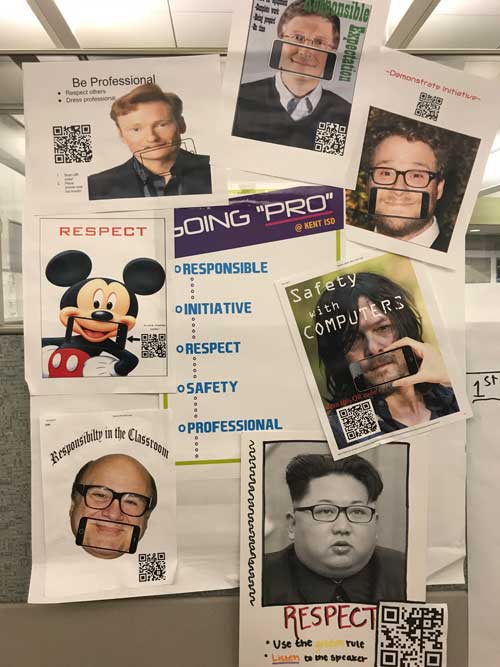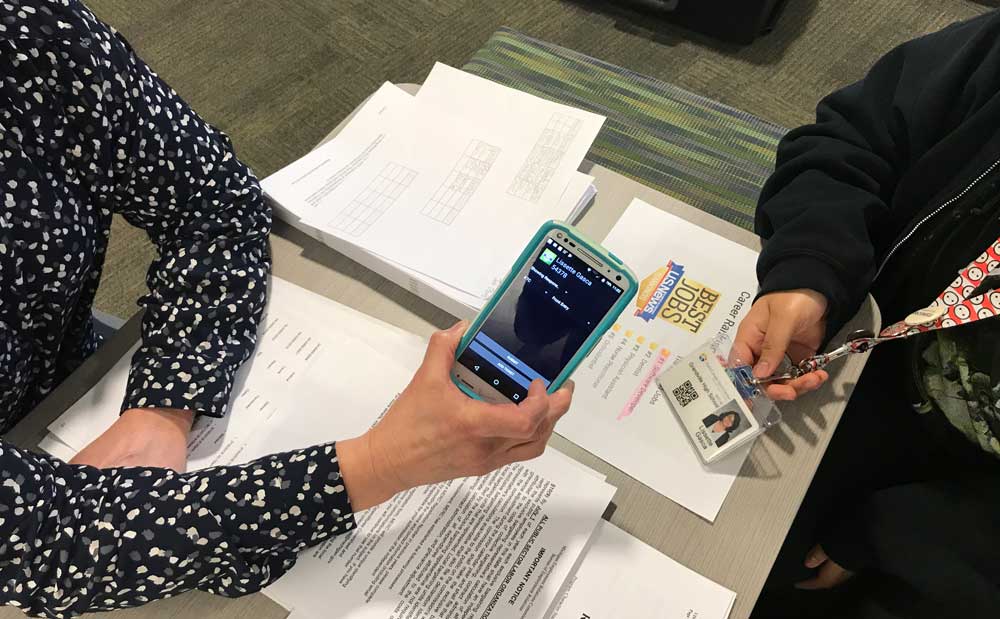Like employees who receive recognition from their companies for good work, students at Kent ISD are receiving virtual positive reinforcement through an app called Going Pro.
Created by three former Kent Career Tech Center students — Wesley O’Connor, Dakota Stickney and Jacob Salinas — the app is being used by teachers in every department at the Tech Center to reinforce positive behaviors.
Going Pro recognizes five different behaviors: being professional, respectful, responsible, safe (physically and emotionally), and demonstrating initiative. When a teacher sees a student embodying one of these exceptionally well, they use the app to scan the QR code on that student’s ID badge. After submitting the virtual praise, an email notification is sent to the teacher, the student, and the student’s parents.
“Usually, with my kids, when we get a call from the school it’s not good news. We’re trying to shift that paradigm,” said Joe Lake, an IT teacher at Kent Career Tech Center who has eagerly embraced using the Going Pro app in his classroom. “We’ve been teaching these types of behaviors here forever, but to formalize it and recognize the kids – that’s new.”

Creating Professionals
Lake explained that students aren’t expected to intrinsically know technical skills, like how to create a website or utilize a particular software. So why would we expect them to automatically develop professional skills? Everyone will “go pro” eventually and be a professional in some field, said Lake, so Going Pro teaches these soft skills and shows students how to behave in professional environments.
Every month, recognized students get to choose items from a reward catalog — things like school T-shirts or coffee mugs — and there is also a quarterly event held for the kids who have been recognized. A recent quarterly event was a food truck rally on campus where Going Pro students were given vouchers as a thank you.
So far, Lake has seen students be rewarded for a variety of acts, such as holding the door open for someone, volunteering at after-school events, sorting items at the recycling center, leading a study group, or even coming to class on time and prepared. Lake also utilizes the phrase “Going Pro” as a reminder to students before an event like a field trip. He reminds them as they step off the bus to “go pro today” and represent the Tech Center in a professional manner.
“The kids really like to be recognized for our Going Pro behaviors,” Lake said. “As a teacher, I make sure to keep those positive behaviors at the forefront of my mind.”
Lake has other dreams for the app, hoping it can be adapted so students can give some praise to each other — possibly scanning another student’s badge when they notice these kinds of positive actions.

By Students, For Students
The app was created by a group of three IT students last summer and launched this school year as part of the Multi-Tiered Support System (MTSS), a Kent County initiative to achieve best practices for teachers based on classroom research. Laura Robinson, an administrative instructional specialist for Kent ISD, said research shows that positives are far more powerful than negatives in creating new behavior. Rather than pointing out what a student is doing wrong (negative reinforcement), the Going Pro initiative leverages positive reinforcement by recognizing students for behavior such as leadership, generosity and professionalism.
Some schools have a ticket system for positive behaviors, but the Tech Center wanted to utilize its resources and create a technological system. Laurie Fernandez, IT instructor, was assigned to lead the project, and she selected three students to develop the app with her: Dakota Stickney of Rockford High School, Joseph Salinas of Caledonia High School and Wesley O’Connor from Forest Hills Central High School.
“At first it seems like an easy concept, but it took us the entire summer to build,” said Fernandez. “It was quite a feat to get it to work the way we wanted it to.” Fernandez made sure to remain a team member on the project, allowing the students to problem-solve and brainstorm on their own. “There was a ton of learning and lots of trial and error.”
Joseph Salinas said that for months they were drawing and revising on whiteboards, editing and changing the look of the app. “It was definitely a great learning opportunity,” Joseph said. “I discovered how to work in a project like this, and it was difficult at first but I learned a lot by doing.”
Dakota Stickney is grateful to have had the opportunity, and he said this project taught him how to make real-world choices. “I hope students have a lot of fun with it and teachers enjoy it, and I hope that it continues to reinforce the Going Pro behaviors,” he said.
Reinforcing positive behavior is not necessarily a simple switch, said Laura Robinson of MTSS.
“It’s a hard shift in your brain to go from ‘stop that’ to ‘I noticed you did this well,” Robinson said.
She is eager to see the long-term impact of positive reinforcement on the campus, she added: “Similar to ‘pay it forward,’ it creates a warm fuzzy, and you’re reinforcing that feeling over and over again.”
CONNECT









